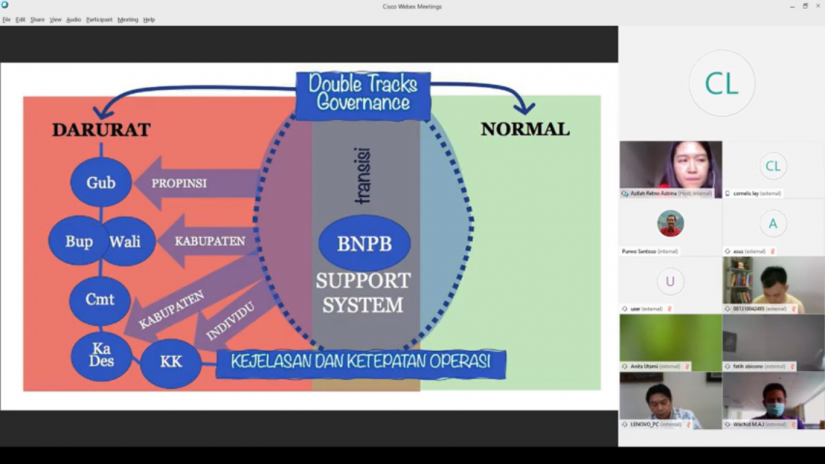
Yogyakarta, 3rd April 2020—”Coordination is really important because we are facing an extraordinary crisis phase. In the normal situation, the highest risks of no coordination are inefficiency or corruption. But in this crisis situation, the risks are our family lives, our brothers and sisters lives, and humanity,” Cornelis Lay said in the Discussion Series Fisipol UGM on the last Friday (3/4).
It presented two professors from the Department of Politics and Government, Purwo Santoso and Cornelis Lay brought an issue about state’s coordination crisis towards COVID-19 in the Covid-19 Crisis Management Discussion Series that held online through Zoom and YouTube Live. According to Cornelis Lay, as known as Conny, coordination needs clear direction of communication. “We do not have equal informations, do not have a clear direction of communication towards each other, and it makes tremendous confusion on the public level, it makes public wonder what the government is really doing, distrust also emerged from the public,” Conny said.
“The coordination problems lie on the vertical authority which is top authority and bottom authority (top-down). Such as national authority, province authority, and district authority that have different paths. In my opinion, there are different policies at the bottom not because they do not want to be involved with the central policies, but they confused about what they should do, meanwhile the central government fights all the time,” Conny said. The coordination problems are also caused by the competition between individuals. “It is still in the minds of public officials that their performances will be measured by the achievement of each units, there is even rivalry to claim that he is the best or the most working person in this current situation,” Conny said.
After that, Purwo Santoso explained that in the last 10 years, the emergency conditions that have been facing by the governance in Indonesia are natural disasters, therefore they stammer when they should handle non-natural disaster, especially health care. “Through the Double Tracks Governance, we know what we should do, marked by the appearance of BNPB to handle the situation when there is an emergency. When we talked about coordination, the capacity of the support system is needed, so that the coordination from the top to the grassroot of individual households that are not established yet, can be established,” Purwo said.
“Learn from Singapore, we can immediately build a digital system information where all the individuals matter and the attached data can be presented properly, both that have not coordinated yet, and already coordinated. Because in Indonesia it has not coordinated yet, the decision often made based on partial judgement,” Purwo added. “We need support system to produce the right decision making. The government has not well established yet, but it could be pursued quickly through big data analytic with various technological instruments that available. But unfortunately, we still inherit the rigid bureaucracy,” Purwo said.
Coordination Is Not Just Hierarchy
According to Cornelis Lay, the fundamental disaster character of COVID-19 is its character is like terrorism, which is indiscriminate target, regardless of the genders, age, economy status, and others. Therefore, coordination from any direction is not a problem. The most important thing is our awareness that we are facing something serious. “Because of its characteristic that indiscriminate target, do not respond the disaster with the logic of hierarchical power or the logic of democracy. This is not the time to debate about centralization or decentralization, it is not about democracy or authoritarian, but the collective logic,” Conny said.
Purwo agreed to that statement. “Because the enemies cannot be seen, crisis management does not care about ‘who can do something’, ‘who does something’, because the most important is the action,” Purwo emphasized. “Coordination is not about the person, but about the conscience to save lives. Ethical code of disasters is lives, awareness to eliminate the chance of a victim is the gamble. If we succeed, Indonesia could have collective wisdom, there is midpoint between communism and market logic,” Purwo said.
Through that discussion, both of the speakers agreed that coordination is not just a technocratic terminology to bring public interests together, it is more like a logical system. Like Jogja, which illustrates the concern of all people through initiatives, with the same objective that do not let anyone becomes a victim. This fundamental essence through the same concern that we called as coordination.
Coordination Dilemma in Bureaucracy
Through Purwo’s analysis, he understood that there was dilemma between the bureaucrats because their sense of humanity is at stake when it judged by the normal law, while it requires them to act in this abnormal situation. “Because the normal is regulated by formal logic, do not let the decision be left because they afraid of the ‘label’ of bureaucracy,” Purwo said. It also concerned by Conny. “Do not let any criminal findings after this crisis that questioned the government’s decisions with normal logic. If that way of thinking is used in the emergency situation, it would make more victims and many other losses that we faced,” Conny said.
Purwo understood that there is a dilemma between authority and decision accuracy, in the unpreparedness there should be anticipatory steps, but it blocked by many resistances. Unfortunately, analysis with critical presumptions makes the public tend to blame the government, rather than emphatize, while the important thing is to manage the dilemma and to find the breakthroughs of many dilemmas.
In the end of discussion, Conny gave a conclusion about the importance of humanity value. “Collective logic is needed to establish teamwork. That in the end of our journeys, humanity is the highest value as a nation. I hope, there will a transformation in the global level and that the rivalry between nations could change to be a collaboration and humanity as our new value,” Conny closed the discussion.
